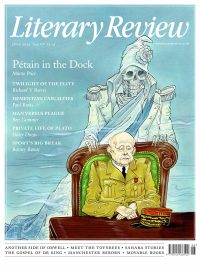Ben Gummer
A Prick in Time
Foreign Bodies: Pandemics, Vaccines and the Health of Nations
By Simon Schama
Simon & Schuster 480pp £30
I was left wondering after a moment of peak Simon Schama – where we are led from his ‘idle’ purchase in Paris of a slim old book on Marcel Proust’s father, Adrien, to his own bookshelves by the Hudson River – whether great historians must have something close to a Proustian affinity for a particular period of history, one they understand not simply as a result of study but which they inhabit emotionally, with a quality not far separated from a kind of memory. The reason why the dim fog of mid-medieval western Europe was cleared by Richard Southern is because he understood that world at an elemental level and could translate that understanding to the reader. The same is true when it comes to Steven Runciman writing on Crusade-torn Byzantium, Eamon Duffy on England on the eve of the Reformation and David Brading on early colonial Latin America.
For Schama, it is the Enlightenment beau monde. When he introduces the japes and exploits of Charles-Marie de La Condamine – ‘ex-soldier, scientific virtuoso, mathematician, intercontinental voyager and traveller and in every respect one of the more swaggeringly outsize figures of eighteenth-century culture’ – it is hard to escape the sense that Schama is talking with him, not just about him, or at least recalling a conversation they enjoyed late last night, half-cut. La Condamine, a friend of Voltaire, became an outspoken champion of smallpox inoculation in 18th-century France. Schama the Encyclopédiste takes us round the salons frequented by La Condamine with an intellectual swagger of his own, and with some justice: he is far better suited to an age that prized the parry and thrust of adorned debate to one in which grey sermonising passes for public argument.
Foreign Bodies is an epic history of inoculation and vaccines, one that begins at the end, in 2020–21, when nature seemed to erupt as human activity came to a near-halt. From there we travel through France, imperial Russia, Messina, Sidon, Bombay and the Raj, Ottoman and British Egypt, Constantinople,

Sign Up to our newsletter
Receive free articles, highlights from the archive, news, details of prizes, and much more.@Lit_Review
Follow Literary Review on Twitter
Twitter Feed
It wasn’t until 1825 that Pepys’s diary became available for the first time. How it was eventually decrypted and published is a story of subterfuge and duplicity.
Kate Loveman tells the tale.
Kate Loveman - Publishing Pepys
Kate Loveman: Publishing Pepys
literaryreview.co.uk
Arthur Christopher Benson was a pillar of the Edwardian establishment. He was supremely well connected. As his newly published diaries reveal, he was also riotously indiscreet.
Piers Brendon compares Benson’s journals to others from the 20th century.
Piers Brendon - Land of Dopes & Tories
Piers Brendon: Land of Dopes & Tories - The Benson Diaries: Selections from the Diary of Arthur Christopher Benson by Eamon Duffy & Ronald Hyam (edd)
literaryreview.co.uk
Of the siblings Gwen and Augustus John, it is Augustus who has commanded most attention from collectors and connoisseurs.
Was he really the finer artist, asks Tanya Harrod, or is it time Gwen emerged from her brother’s shadow?
Tanya Harrod - Cut from the Same Canvas
Tanya Harrod: Cut from the Same Canvas - Artists, Siblings, Visionaries: The Lives and Loves of Gwen and Augustus John by Judith Mackrell
literaryreview.co.uk